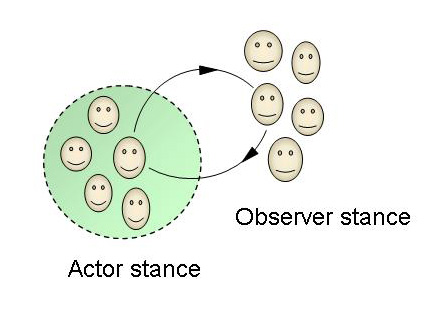Research methodology
ICROFS aims to ensure that the research system focuses on the most relevant challenges for organic farming and food systems, and for the sustainable development of agriculture as a whole. Advancing relevant and proactive research that can provide guidance for the future development demands attention to and inquiry into the goals and values of the system in question. In this case, the holistic perspectives and the special goals and values that guide organic farming and the sustainable development of agriculture.
Agricultural systems are very complex, and therefore an analytic splitting up and reduction is absolutely essential in every investigation process. The problem remains, however, that the analytic reduction of systems can be carried out in many different ways, depending on the methodologies, points of view, values and interests involved.
For this reason, a self-reflective systems approach is needed that acknowledges the role of organic research as both actor and observer (Figure 1), and which seeks to expose the ways of reduction chosen in research, how these are related to the larger system and the values involved, and the consequences of these choices for the results obtained.

- Figure 1 Research in organic farming and food systems is both an actor and an observer. There is therefore a need to work explicitly with the value-laden context of the research activities. Alrøe and Kristensen 2002
Given this context, special consideration is given to the development of research methodology in ICROFS. Research that seeks actively to participate in the development of organic agriculture needs to be particularly aware of how and where values play, or should play, a role in research. We refer to this as “reflexive objectivity”.
Investigation and clarification of the values in the organic movement is therefore a task of particular significance for research in organic agriculture. And organic research must face the problem of how to acknowledge and incorporate the fundamental principles and values of organic agriculture while preserving scientific standards of objectivity.
ICROFS (and formerly DARCOF) has supported the development of research methodology through national workshops on research methodology with both experienced and new researchers in the field of organic agriculture, an interview study with organic researchers, and a Ph.D. project on the philosophical aspects of wholeness-oriented research in organic agriculture. Research methodology and analyses of values and scientific perspectives have also been important aspects in many of the knowledge syntheses carried out by ICROFS.
Read more about knowledge syntheses.
Focused workshops have been held on the specific problems of research in, for instance, organic food and human health, long term trials and research on private farms. ICROFS has also participated in European workshops on research methodology and systems thinking in relation to organic farming and food systems.
The development of research methodology has involved both researchers and representatives from the organic movement, with the purpose of mutual education, inspiration, and self-reflection in an ongoing process. The work will continue in the coming years as a means to further develop the "research paradigm" of ICROFS.